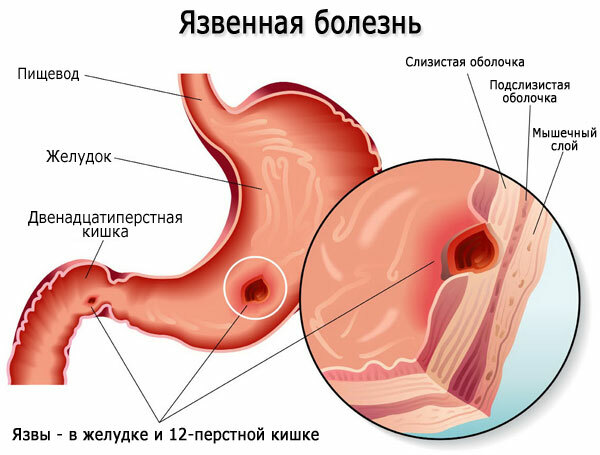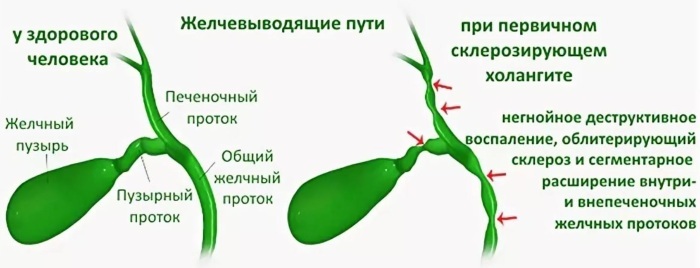Gastrointestinal tract in humans performs critical functions. Diseases of this part of the digestive system are the states in which the affected mucosa of the stomach and intestines, severe complications develop. They threaten not only the health but also the patient's life.
The content of the article:
- 1 kinds of diseases
- 2 Stage and grade
- 3 symptoms
- 4 Causes
- 5 Diagnostics
- 6 When to see a doctor
- 7 prevention
-
8 therapies
- 8.1 Medications
- 8.2 Traditional methods
- 8.3 invalid food
- 8.4 Other methods
- 9 possible complications
- 10 Video of gastrointestinal diseases
kinds of diseases
There are several types of diseases that affect the stomach and intestines of man. No strict classification of states, but doctors distinguish acute and chronic conditions. First develop suddenly, accompanied by severe symptoms, often threaten the patient's life.
Chronic diseases usually develop slowly, are the result of violations of other organs and complicated. The patient may for a long time not to notice symptoms, which also aggravates the condition.
The most common diseases of the gastrointestinal tract are the following:
-
Gastritis - an inflammatory disease of the mucous membrane of the stomach, provoking the formation on the inner walls of small erosions. In this case, the patient worried about different symptoms, such as heartburn, indigestion, nausea.

- gastroduodenit - disease of the gastrointestinal tract that affects the mucous membrane of the stomach and duodenum. In this case, symptoms reminiscent of gastritis, so the patient does not immediately go to the doctor.
- Enteritis - inflammation of the small intestine that provokes the formation of authority on the walls of small ulcers and erosions. In this case, the patient concerned about pain, cramps and bloating.
- Colitis - inflammation of the inner walls of the colon. Symptomatology is slightly different from the manifestations of enteritis, but the disease is usually in conjunction with this disorder.
- Ulcerous lesions of the stomach, duodenum and intestines - common disease, which in most cases develop in the absence of treatment in the case of the onset of symptoms of an inflammatory condition.
- Gastrointestinal bleeding - the state, serving as a complication of peptic ulcer disease of the digestive tract. In the vomit and stool of the patient an admixture of dark blood. Condition is considered very dangerous for human life.
Apart from diseases, damage to the inner walls of the digestive tract can be associated with the appearance of benign or malignant neoplasms.
Stage and grade
Gastrointestinal diseases occur in stages, regardless of species status. The initial degree is characterized by the absence of symptoms, which could be a reason for treatment to the doctor. The patient leads a normal life, but the mucous membrane has already been changed.
Progressive stage is usually accompanied by the appearance of severe symptoms. Patient worries nausea, vomiting and pain in the stomach, intestines. Gradually, his condition worsens, symptoms become more pronounced, and decreased appetite.
At an advanced stage the patient is exhausted, dehydrated, often located in a horizontal position. At this stage, the disease is complicated treatment lasts long.
It is worth noting that all the stages are developing rapidly, so the disease quickly goes into running shape at an acute form of disease. During the chronic symptoms are poorly expressed. But this species is not considered to be more secure because more often leads to the development of complications.
symptoms
With the development of one of the patient's gastrointestinal diseases may disturb a variety of symptoms, depending on the specific disease and the extent of its neglect.
The most common manifestations are as follows:
- Nausea and vomiting attacks, which in most cases facilitate the patient's condition. With the development of bleeding vomit have dark brown or even black.

- Heartburn and belching.
- Indigestion, heaviness after eating.
- Spasms of smooth muscles of the intestine and stomach.
- Pain in the epigastric area, the navel.
- Constipation or diarrhea. Often these states alternate, which further weakens the patient.
- Appetite loss.
- Empowered flatulence, bloating.
- Weight loss.
Among the external manifestations of disease can be identified deterioration of the skin, dryness and peeling. With long-term course of the disease in the patient notes brittle nails and hair, rash on the face. Sometimes the skin becomes jaundiced because the pathology of the stomach and intestines often provoke complications of the liver, gallbladder.
the patient's stomach can be inflated, he feels severe pain when touched. If the condition is associated with hemorrhage, anterior abdominal wall muscles are tense, the patient becomes pale, moist skin. The patient is in the supine position, when trying to test the stomach and intestines there is a strong and sharp pain.
When bleeding is also observed diarrhea, which in medicine is called "coffee grounds". Such a phrase very accurately describes the stool, which in color and texture do resemble coffee grounds. Additional symptoms for bleeding is a sharp decline in blood pressure to critical levels.
Causes
Gastrointestinal disorders are the result of various causes and predisposing factors. Experts can only determine the cause of bleeding. In most cases, it develops as a result of severe damage the stomach lining and intestines, resulting in blood separation. In addition, it could be a heavy physical exertion.
Other diseases of the digestive tract are commonly caused by other reasons.
The principal will be the following:
- Regular violation of the diet, occasional meals.
- Eating fatty and fried foods, as well as acute food.

- Alcohol abuse.
- Constant overeating, provoking an increase in volume of the stomach and indigestion.
- Frequent stress, which stimulate the production of hydrochloric acid, a negative impact on the gastric and intestinal walls.
- Professional activities related to work at night. Experts have shown that such patients often suffer from gastric ulcer and duodenal ulcer, which increases the likelihood of bleeding.
- The penetration of bacteria into the organism Helicobacter pylori. This micro-organism provokes the development of gastritis and gastroduodenitis, which also increases the likelihood of complications such as ulcers and bleeding.
- Acceptance of hot drinks in large quantities, as well as the use of hot dishes too. Such a habit leads to injury of the gastric mucosa and the development of inflammation.
- Many years of smoking also increases the amount of gastric juice and the development of inflammation, ulceration.
- Prolonged and uncontrolled use of nonsteroidal anti-inflammatory drugs, aspirin and antibiotics.
One or more of the reasons certainly provokes disorders of the digestive tract.
Diagnostics
Gastrointestinal disorder is difficult to diagnose in the absence of symptoms. Disease may not manifest itself for a long time. Various methods are used to survey that accurately determine the cause of the disorder.

| Method | Description | Cost, location |
| General examination and patient survey | The first step is to identify the causes of the disorder. Specialist listens to the patient's complaints, the duration of their symptoms. Then it examines the skin, mucous membranes and the patient's tongue | Typically, payment for examination is not required to inspect any hospital |
| Clinical study of blood | The overall analysis helps to detect abnormalities in the internal organs. | Held in each clinic in the private price is about 200 rubles. |
| biochemical analysis | To analyze blood taken from a vein, the result allows to see disorders of the liver and pancreas. In disorders of the stomach and bowel complications occur almost always. | Available for each clinic, the price of the private institution is about 200-300 rubles. |
| A study to identify the body Helicobacter pylori | The bacterium can be detected by diagnostic feces and blood. For an accurate result, both methods are used, but sometimes it is enough to examine blood from a vein on antibodies produced by the body against bacteria. | Held in public and private clinics. The second offer diagnostics for 400 rubles. |
| EGD | Fibrogastroduodenoscopy is the most effective method. In this case, patients are encouraged to swallow the probe, the tip of which is a miniature camera. Thanks to her, the image displayed on the monitor, the specialist examines the state of the gastric mucosa and duodenal ulcers. | In the public hospital research is usually carried out free of charge. The private costs about 300 rubles. |
| Using MRI contrast agent | The technique is effective and widespread when other methods do not help identify the disease and its presumed causes. In this study the digestive tract by the magnetic field. To obtain a clearer picture of intravenously injected contrast agent, which is concentrated in the affected area. | Carried out in clinics where there is adequate equipment. The price is about 1000-1300 rubles. |
The most effective method is considered MRI and EGD.
 Through this survey can accurately determine the lesion site and extent of disrepair.
Through this survey can accurately determine the lesion site and extent of disrepair.
When to see a doctor
When the frustration on the part of the digestive tract is recommended not to postpone the visit to the doctor. Such cures diseases, gastroenterology, but the absence of such a specialist in the village engaged in treatment the therapist.
If the patient showed signs of gastrointestinal bleeding, you should immediately call an ambulance, which will take the patient to the hospital surgical department. Do not put off a visit to a specialist, even if there are no acute symptoms of the disease.
prevention
Gastrointestinal diseases is much easier to prevent than to cure. To do this, you must normalize the diet, give up bad food. It is important to exclude from the menu canned, smoked and soft drinks. In addition, it is necessary to minimize the amount of alcohol consumed.
One of the most important methods of prevention is considered to be the elimination of stress.
 It is recommended to keep calm in any situation, to not provoke the production of hydrochloric acid. When you need to work the night shift should try not to stick to this schedule on weekends, so the body does not adapt to such a schedule.
It is recommended to keep calm in any situation, to not provoke the production of hydrochloric acid. When you need to work the night shift should try not to stick to this schedule on weekends, so the body does not adapt to such a schedule.
The period of treatment with antibiotics and nonsteroidal anti-inflammatory drugs must also take medications protect the stomach lining. They help to prevent organ damage during treatment.
Patients who abuse tobacco, it is recommended to give up the addiction.
therapies
For the treatment of digestive tract diseases specialists use several methods. The main treatment is considered a dietary food that reduces the burden on the stomach and intestines. In addition, doctors prescribe medicines and some methods to improve the patient's condition.
Medications
Treatment of diseases involve administration of drugs from different groups to provide an integrated feedback.
The most effective means are the following:
- De-Nol - capsules, which are a group of antimicrobial agents act directly on Helicobacter pylori, destroys bacteria and prevents the development of peptic ulcer disease. Accepted need to take 2 capsules a day for a month. The cost of packaging the drug is about 300-400 rubles. depending on the region.
- pancreatin - an enzymatic preparation, which improves digestion and assimilation of the most important components. Means prevents indigestion and greatly facilitates the work of the entire digestive tract. For the treatment will need to take 2 tablets 3 times a day for 2-3 weeks. The price of the packaging drugs varies between 50-70 rubles.
- gastrotsepin - a preparation for restoring the gastric mucosa, characterized by high efficiency. Used for gastritis and colitis, as well as the combination of inflammatory diseases of the digestive tract. Typically agent administered as a solution for injection administered daily in 2 ml intramuscularly course duration - at least 10 days. Price 1 vial of medication is about 30-40 rubles.
- omeprazole - a preparation from the group of proton pump inhibitors, wherein efficiency and suppressing intensive production of hydrochloric acid. Administered in the form of capsules or tablets. The day should take 3 tablets, course duration - 2 weeks. The drug costs about 120 rubles.
- amoxiclav - an effective antibacterial drug that is prescribed for inflammatory diseases of the stomach and intestines. It helps to prevent the proliferation of microorganisms and the worsening condition. For best results, the agent is administered intravenously 2 times a day for 7 days. Cost of 1 vial of powder for solution is 40-50 rubles.
- Dicynone - hemostatic drug, which quickly spread through the bloodstream and prevents excessive gastrointestinal bleeding. Administered as a solution for intramuscular or intravenous administration. The day the patient is administered from 2 to 4 ampoules of 2 ml. The duration of the therapeutic course - from 5 to 14 days. Price means the package - 60 rubles.
In addition, can be assigned and other means to address the specific symptoms of the disease. In each case, a set of different drugs and dosage adjusted individually.
Traditional methods
Gastrointestinal diseases are often treated using alternative medicine prescriptions. Some of them have different efficiency.
The infusion based on chamomile - a popular antiseptic and anti-inflammatory agent. It helps destroy pathogens and normalize digestion. For medication must insist 3 g of dry material in 300 ml of boiling water for 30 minutes, filtered and taking 100 ml 3 times per day. Duration of the course - 7 days.
Broth nettle - an effective remedy for the development of gastrointestinal bleeding, as nettle possesses hemostatic properties. Preparing a medicine: to 1 L of water required 20 g of dry feed should boil 5 minutes, then infuse at least 1 hour to filter. The finished drug 3 times a day, to use 50 ml. Duration of treatment - no more than 7 days.
Decoction of oak bark has astringent properties and helps to alleviate the condition of patients with gastritis, accompanied by loose stools. Cooking medicine must be of the dry and pre-shredded bark. 500 ml of water, 20 g of raw material needed, it is necessary to boil for 10 minutes, to insist - 2 hours filtered. Consume 20 ml in the morning and evening for 10 days.
Any prescription of alternative medicine can trigger complications, so they can be used only after the test.
invalid food
Any disease of the digestive tract is necessary to adhere to a strict diet during treatment and after its completion for 2-3 months to consolidate the results. The most strict diet is when gastrointestinal bleeding, because the patient is not allowed to eat food from 2 to 5 days. Allowed only reception of cold water in small quantities.
In other diseases should be excluded from the menu Products:
- Fried, sour, spicy and salty foods.
- Spices, marinades.
- Ketchup, mayonnaise and other sauces.
- Smoked, canned, pickled vegetables, canned fruit.
- Confectionery and baking.
- Fatty meats, smoked and salted fish, fatty dairy products.
- Sausages.
- Carbonated and alcoholic drinks, strong coffee.

Allowed to eat dairy products, boiled meat, low-fat soups. It is useful to include in the diet of steamed vegetables, baked fruit and galetnoe cookies. In addition, it is important to eat porridge, mashed potatoes without butter, boiled fish. Allowed to prepare meals for a couple without the addition of spices and oil.
Approximate daily menu should include useful, but light meals. For breakfast you can consume buckwheat porridge without butter, soft-boiled egg and drink black tea rather weak. Lunch should consist of a first course, such as potato soup, chicken broth, as well as beef patties and chicken, steamed.
Dinner should be replaced by a glass of low-fat yogurt, wafer biscuits. Portions should be small. In each case, the menu is made individually.
Other methods
The only alternative method of treatment of gastrointestinal disease is surgery. It is indicated for ulcer perforation of the stomach or intestines, and acute gastrointestinal bleeding when the blood can not be stopped by conservative.
The operation involves opening the anterior abdominal wall, followed by removal portion, which causes bleeding. When perforation of part of the stomach is removed, it is made followed by suturing deducing several drainage from the peritoneal cavity.
Interference is performed under general anesthesia recovery period lasts at least 4 weeks. The operation is considered an extreme measure is only done when there is a threat to the life of the patient.
possible complications
If left untreated, complications will certainly develop. The most common ulcer is considered when the patient does not go to the doctor if symptoms of gastritis. In addition, the possible development of peritonitis with perforation of the ulcer and the outlet of the stomach contents into the abdominal cavity.

Condition is dangerous for the patient's life. In addition, any disease can become chronic. Frequent consequence - the depletion of the patient, asthenia, anemia as a result of regular blood loss. The most dangerous complication - death.
Gastrointestinal disorders are considered to be a fairly common problem among patients of different sex and age. Diseases require early treatment to help prevent complications.
Registration of the article: Vladimir the Great
Video of gastrointestinal diseases
Elena Malysheva tell about 3 tests for gastrointestinal diseases:



